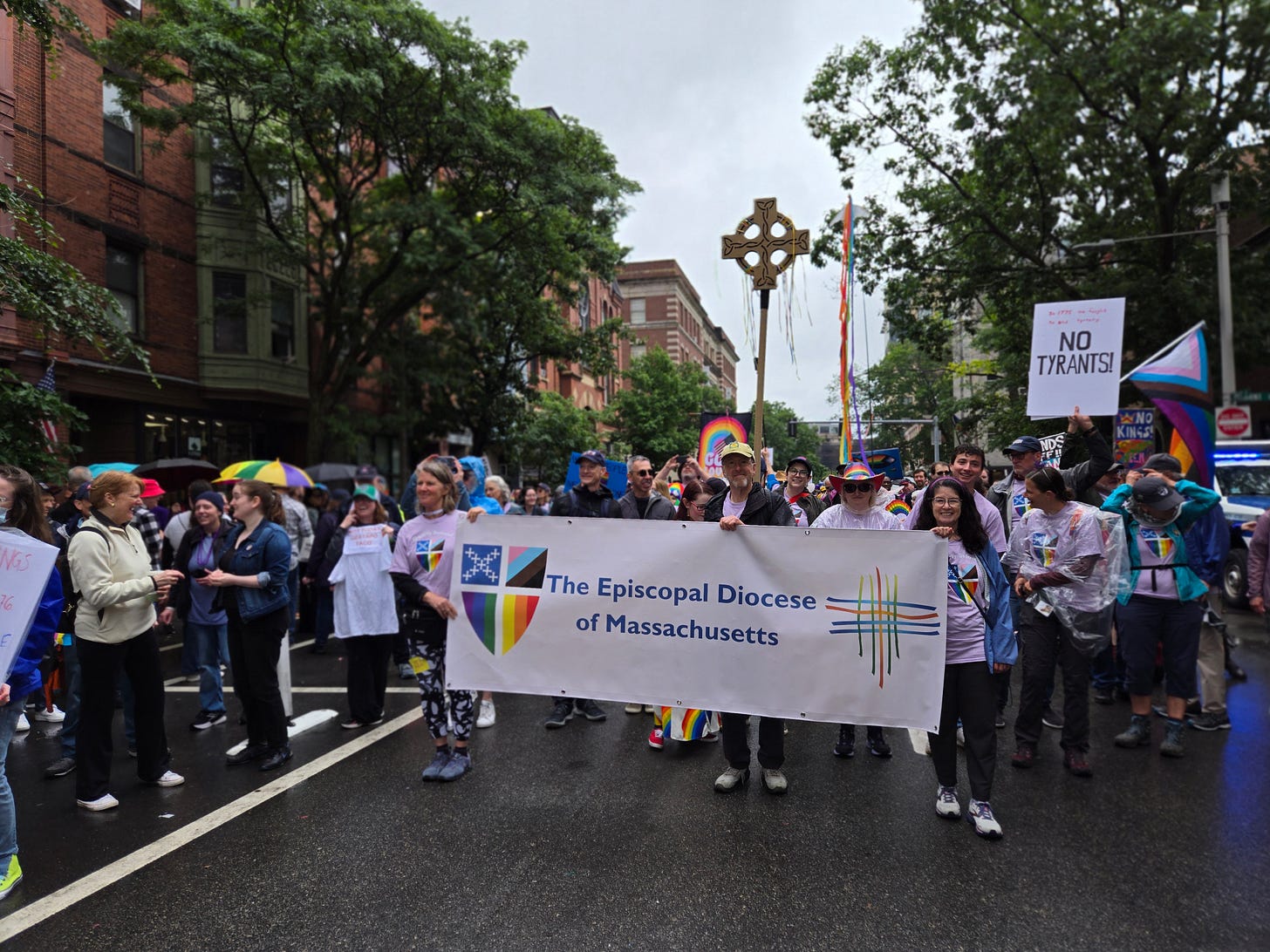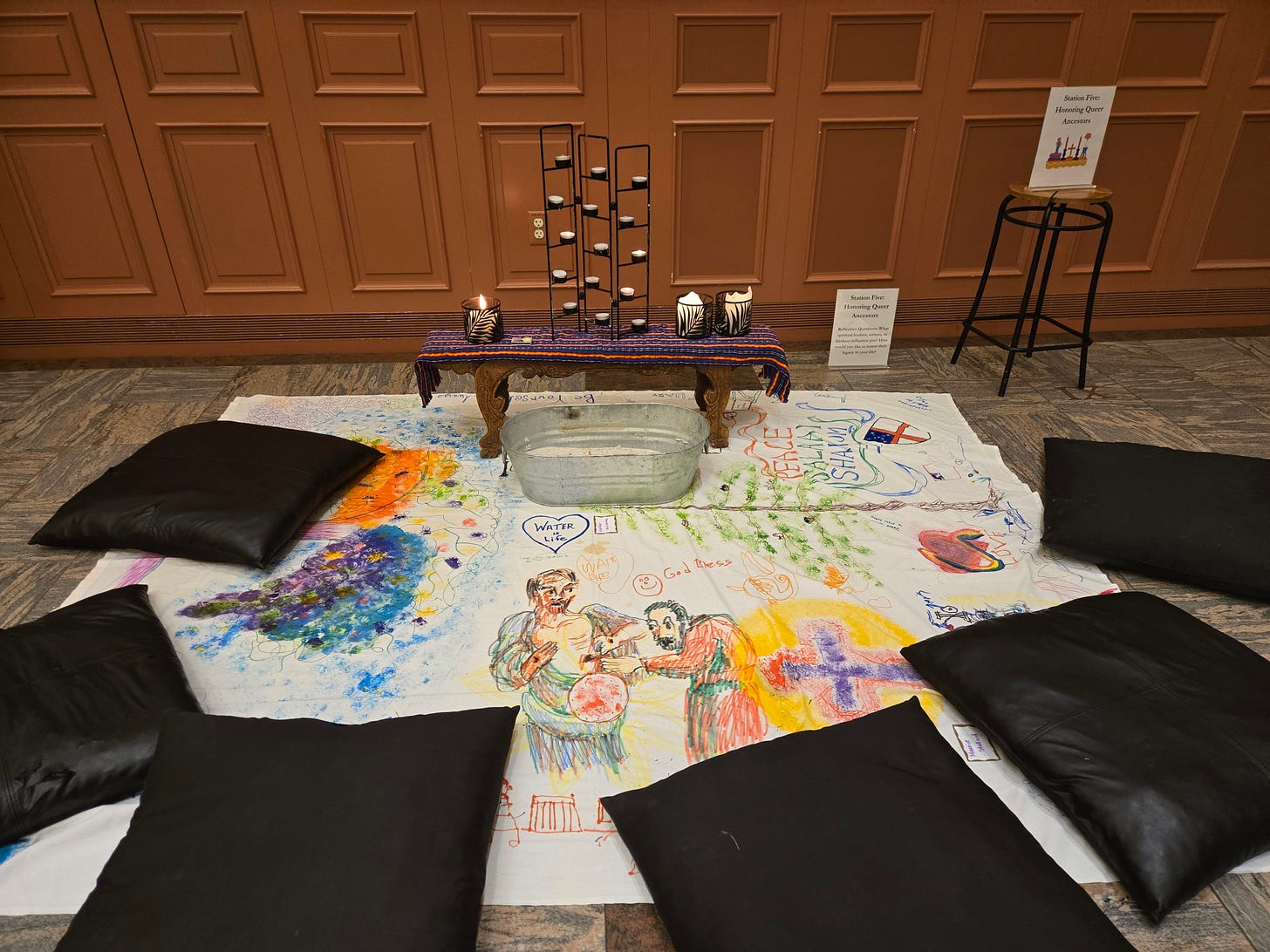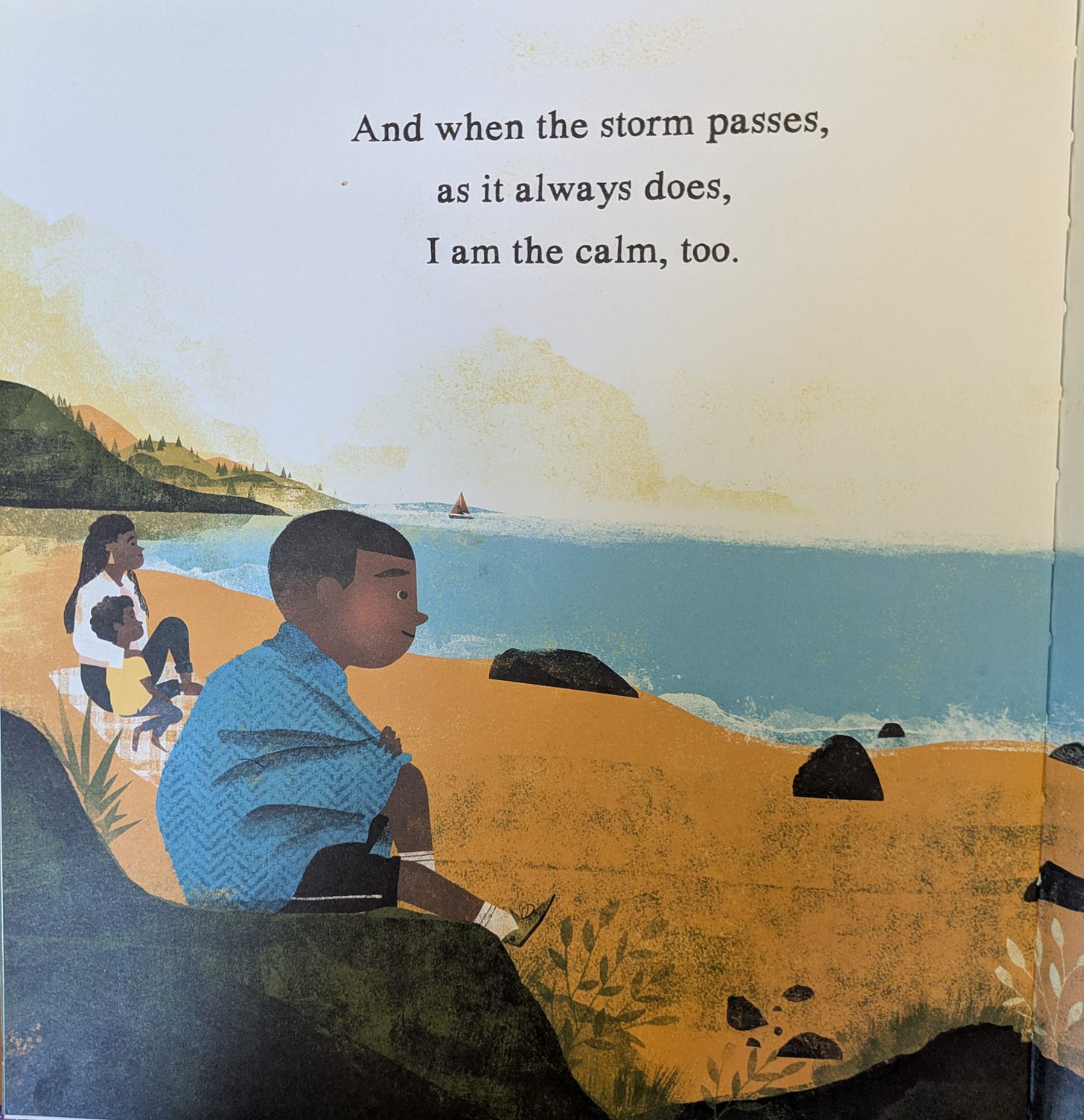This sermon was preached for Sunday, June 22, 2025. The texts for this sermon were: 1 Kings 19:1-4, (5-7), 8-15a, Psalm 43, Galatians 3:23-29, and Luke 8:26-39.
My kids have this picture book, it’s called, I am the storm by Janet Yolen and Heidi Stemple. I bought it because it teaches kids about natural disasters; that storms always pass and how neighbors can help each other in the aftermath.
The book ends this way, “Nature is strong and powerful. But I am strong and powerful, too. I am loud like the tornado. I am wild like the blizzard. I am hot like the fire. I am fierce like the hurricane. I am the storm. And when the storm passes, as it always does, I am the calm, too.”*
I thought of this book one day when one of my toddlers was caught up in a raging storm of their own emotions, the kind of tantrum where the only thing to do is take them up to their room and make sure they’re safe while you both wait it out. I sat in their room with them, leaning against their door as they wailed and thrashed, and I said over and over to myself and to them, When you are the storm, I will be your calm. I am your calm. I am your calm. I am your calm.
And when it got hard, when my heart beat faster and my cortisol spiked and my child’s screams ripped through me, I closed my eyes and reached for my own source of calm, the one deep within me. And I remembered the chant someone taught me once, but don’t worry I won’t sing it, a chant based on a Quaker poem that’s based on this story from first Kings: “Speak through the earthquake, the wind, and the fire, O, O, still small voice of calm.”
Because when the wind came, so strong it tore apart the rocks of a mountain, God was not in the wind. And when there was an earthquake that shook the very roots of the mountain, God was not in the earthquake. And after the earthquake, a fire. But God was not in the fire. And after the fire a sound of:
And the word right here, there’s a ton of ways to translate this, from the Hebrew, and totally legitimately, too. The word is demamah. It could be onomatopoeia, it could mean: a gentle whisper, a still small voice, or sheer silence. Each translation has different powerful theological implications, don’t they?
And after the fire, there was the sound of: a gentle whisper, a still small voice, sheer silence.
And Elijah, God’s prophet, knew God’s presence. God was not in the earthquake, the wind, and the fire. God spoke to Elijah in a still, small voice of calm.
You may remember that just a few Sundays ago, we celebrated the coming of God the Holy Spirit as a mighty wind and tongues of flame. Pentecost Sunday brings Easter season to a close and Trinity Sunday, last Sunday, launches us into the long liturgical season after Pentecost. This season, this year, we begin our journey through the stories of the prophets in the Old Testament.
These stories remind us that prophets exist to speak truth to power. Prophets are there to hold unjust leaders accountable for the ways they have betrayed their people and broken their relationship with God. The two books of First and Second Kings, describe how David’s united kingdom divided into Israel in the north and Judah in the south. It’s the familiar story of how power, greed, and lust corrupt very flawed human beings, again and again, and how God uses human beings, who are also very flawed, to convey God’s message of justice, hope, and love.
Today we are dropped right into the middle of the story of one of God’s main prophets, Elijah, so let’s recap a little. King Ahab and Queen Jezebel of the northern kingdom of Israel have been encouraging the worship of another foreign God, Baal, alongside the worship of God. So Elijah, the prophet of God, challenges the priests of Baal to a dramatic contest: you call on your God to burn up some offerings, and I’ll call on mine, and whichever God answers by fire is the true one. Baal’s priests call out to Baal, but “there was no voice, no answer.” “They raved on,” the text says. “But there was no voice, no answer, and no response.” But Elijah’s God sure does respond, and the resulting all-consuming conflagration burns up everything, even a moat of water around the altar. God is in the fire.
But Elijah takes things too far. Drunk with power and in a fit of zealous rage, Elijah murders the priests of Baal, hundreds of them. God didn’t ask him to do this, by the way. The text offers no judgment on his actions here, but we can. Elijah’s violence also brings the wrath of Queen Jezebel down upon him. So Elijah flees from her and King Ahab to the southern kingdom. And here we find him, despairing, certain that the journey ahead of him is too much for him to bear. God first responds by sending an angel to remind Elijah to have a snack and take a nap. Then Elijah continues on, to Mount Horeb, the mount of God, which is the same as Mount Sinai, the mountain the prophet Moses went up so long ago.
So when Elijah prepares to see God, it really, really matters that this fiery, zealous prophet learns that God of fire and storms can also be found in silence. In a gentle whisper. In a still, small voice.
I am the storm. I am the calm, too.
The stories of the prophets remind us that we are all called to be prophetic, each in our own way. As Christians, we must hold people in power accountable when they make choices against God’s mandate to protect the poor and the vulnerable. When the society around us seems to revel in rejecting God’s values, we are to adhere to the covenant, no matter the consequences. As Episcopalians, this is our covenant with God: to preserve in resisting evil, to strive for justice and peace among all people, and to respect the dignity of every human being.
Presiding Bishop Sean Rowe ended his June 11 letter to the church, “Acting faithfully in troubling times” by reminding us of those particular baptismal promises. He wrote, “At its best, our church is capable of moral clarity and resolute commitment to justice. I believe we can bring those strengths to bear on this gathering storm. Churches like ours, protected by the First Amendment and practiced in galvanizing people of goodwill, may be some of the last institutions capable of resisting the injustice now being promulgated. That is not a role we sought—but it is one we are called to.”**
This gathering storm. Bishop Rowe named some elements of the storm he sees in his letter: domestic military deployments, the weaponization of government entities for political advantage, the denial of due process to immigrants, and defunding of public health, social service, and foreign aid programs. But there are other storms, too. War. So much war, all around the world. Climate change. Literal volcanic eruptions. Ripping away of trans rights.
And there are the gathering storms of our personal lives, so close, so real, tearing apart the rocks and shaking the foundations of our lives: financial pressures, job stress, marital woes, worrying health news. When the wind and fire and quake come bearing down upon us, where is God?
On Saturday, as we flanked the Bishop’s convertible in the Pride parade, our parishioner Jeff, hyped up the crowds, football stadium-style shouting, “We aren’t here to be quiet!” And he was right. We weren’t there to be quiet. We were there to be loud and proud. There to sing and chant, “Who’s got your back? God’s got your back.” and “No fear, love wins! Love wins, no fear!” Many more people were also there in Boston, and in Groton, and Maynard, and Los Angeles, and so many other cities and towns across the country, aiming to hold leaders accountable and speak truth to power. To be prophets.

And.
Sometimes we are also here to be quiet. Sometimes we are also here to offer calm to a world overwhelmed by war, corruption, rising sea levels, unchecked contagion, cruelty, and injustice. To remind people that true strength is found not in overpowering domination and violent obliteration, but in steadfast conviction and commitment to the values of love and peace. On Saturday, three hundred Episcopalians marched in the loud, proud parade and gathered to cheer the parade on the steps of the Trinity Church in Copley Square. But at the same time, across from the festival and protest on Boston Common, the Episcopal ministry, The Crossing, offered a sanctuary for, as the organizers put it, “quiet queers.” Over the course of the morning, a couple of hundred people came inside our Cathedral to pray, draw, meditate, or walk the labyrinth.

When shots rang out at a protest in Salt Lake City that same day, Utah Bishop Phyllis Spiegel opened the doors of her own Cathedral so that people could seek shelter.*** As frightened strangers streamed in she told them, “You’re safe. Come in. Look behind you – somebody behind you might need help.” And when people were scared that the shooter might follow them inside, the Bishop reassured them, saying, “They will go through me before they’d get in.” She prayed with them and offered a calming presence, and when the all-clear was issued about an hour later, some people didn’t want to leave.
That's prophetic, too.
Sometimes we need to be reminded that God is found in the still small voice inside, the one we hear best when we’ve had a snack and a nap. Maybe the one we hear best when we are on the brink of giving up, or finally remorseful for how we took things too far. Maybe the one we recognize only when we take the space and time apart to return to a place that has known God, and we close our eyes, breathe deeply, and lean against something solid.
God is the storm. God is the calm, too.
We are strong and powerful, we are loud and wild and hot and fierce. We are the storm. And we are the calm, too.
God is here in the sheer silence. God is here in the still small voice.
Will you listen with me now?
Amen.
* Jane Yolen and Heidi E. Y. Stemple, “I Am the Storm,” Illustrated by Kristen Howdeshell and Kevin Howdeshell, Penguin Random House, October 27, 2020. https://www.penguinrandomhouse.com/books/636228/i-am-the-storm-by-jane-yolen-and-heidi-e-y-stemple-illustrated-by-kristen-and-kevin-howdeshell/
** Presiding Bishop Sean Rowe, “Acting Faithfully in Troubling Times,” June 11, 2025. https://www.episcopalchurch.org/publicaffairs/acting-faithfully-in-troubling-times-a-letter-from-presiding-bishop-rowe/
***Melodie Woerman, “Utah cathedral opened its doors to shelter ‘No Kings’ rally protesters as shots rang out,” June 18, 2022. https://episcopalnewsservice.org/2025/06/18/utah-cathedral-opened-its-doors-to-shelter-no-kings-rally-protesters-as-shots-rang-out




